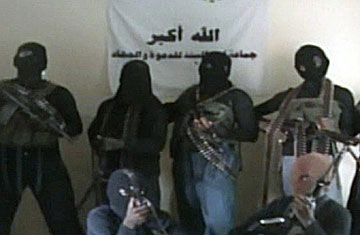
A 2010 screen grab of a video reportedly released by Nigeria's Boko Haram shows alleged members gathered in an undisclosed location
When a suicide bomber drove into the U.N. building in Abuja's leafy diplomatic quarter on Friday, detonating his Honda Accord and killing at least 18 people, an Islamist terrorist group that was little known outside Nigeria violently thrust itself onto the international stage.
Until recently, the group Boko Haram has conducted attacks on Nigerian government targets in what most terrorism experts considered an indigenous campaign to further the organization's aim of installing Islamic law in West Africa's most volatile country. Friday's attack now has officials and experts worrying that a branch of al-Qaeda has spread its influence to Nigeria, Africa's most populous country and a key supplier of oil for the U.S. and the world market. Though no evidence of a partnership has been established, al-Qaeda in the Islamic Maghreb (AQIM), the terrorist giant's arm in northwest Africa, has previously issued statements in support of Boko Haram.
Even before the bombing, U.S. military officials were growing anxious about possible links between Boko and established Islamist terrorist groups. Carter Ham, the U.S. military's commander of operations in Africa, told the Associated Press on April 17 that multiple unnamed sources indicated that Boko Haram had made contact with operatives from AQIM and with the Somali terrorist group al-Shabab.
"I think it would be the most dangerous thing to happen not only to the Africans, but to us as well," Ham said. "What is most worrying at present is, at least in my view, a clearly stated intent by Boko Haram and by al-Qaeda in the Islamic Maghreb to coordinate and synchronize their efforts. I'm not so sure they're able to do that just yet, but it's clear to me they have the desire and intent to do that." Ham also touched on what he said could be a "loose" partnership with al-Shabab, which would mean Boko Haram's reach extends thousands of miles across the African continent.
A partnership between Boko Haram and AQIM, which operates in close proximity to Nigeria in Mauritania, Mali, Niger and Algeria, could explain the increased sophistication of recent Boko Haram attacks, including the use of Friday's car bomb. It could also mean an increase in cash flow for Boko Haram, which currently makes most of its money through taxes and by robbing banks throughout the Muslim northern half of the country. Heightened fear about an al-Qaeda link comes as religious tension explodes in already-tense central Nigeria. On Monday, Aug. 29, there were deadly clashes between bands of machete-wielding Christian and Muslim youths in the town of Jos, long a center of violence between northern Muslims and southern Christians.
The benefits for Boko Haram in teaming up with AQIM might be an influx of money and expertise — but also an international profile that would give it credibility as it attempts to recruit more followers and further scare a nervous Nigerian government. "AQIM sits on a fairly large supply of money, as well as explosives. There's a possibility that a relationship between them could open up access for the Boko," says Andrew Lebovich, a policy analyst for the National Security Studies Program at the New America Foundation, who specializes in studying AQIM. "People have been talking about [the U.N. attack] as a coming out, as a sign to al-Qaeda that they were looking for a merger," he says.
Despite a steady stream of attacks on Nigerian government targets since 2009 — including a June bombing of Abuja's police headquarters, which left five dead — "they staged an attack on the U.N. and they got more coverage than ever," says Lebovich. "So there's a logic."
An alliance would have a corresponding benefit for al-Qaeda, which has made the southern expansion of its African operation a priority since Algeria — its former major target — began cracking down on the group in 2008. A partnership with the efficient Boko Haram could perhaps give AQIM a foothold in one of Africa's most important, volatile countries. "They don't get as much recognition from international jihad groups because they haven't really engaged in large-scale operations, and because they haven't attacked Europe — so many are still suspicious of how effective they are," Lebovich says. "This would be a way of solidifying their place within al-Qaeda."
Although Boko Haram's exact size is hard to pinpoint, it likely has around several thousand supporters and at least 300 militant members who are available for armed actions, says Dr. Peter Lewis, director of the African-studies program at the School of Advanced International Studies at Johns Hopkins University. In 2009, Nigerian security forcefully destroyed the group's Maiduguri compound and killed its then leader Mohammed Yusuf. After months of dormancy, Boko Haram returned to the spotlight in September 2010, pledging to avenge Yusuf's death.
It's unlikely that even with an al-Qaeda tie, Boko Haram would take the fight against the government beyond Nigeria's borders. "They indicate they'll remain within Nigeria," Lebovich says. In a call to the BBC on Friday, a Boko Haram spokesman "justified the attack in part because he said the U.N. was one of the international organizations that supported the Nigerian government, so it's still a Nigeria-focused argument."
But the global terrorism community will now be watching the group's every move, especially for evidence that it might be morphing into a new branch of a terrorist group that has so far had little impact in non-Arab West Africa. If Nigerian security forces start seeing proterrorism propaganda and Boko Haram operatives working in neighboring countries like Mali and Mauritania, then what is currently fearful speculation would be replaced, Lebovich says, by "concrete evidence of a partnership." Nasser Weddady, outreach director at the American Islamic Congress, cautions that the speculation is not just idle chatter. Friday's bombing "is a wake-up call to Nigeria to get its act together."
